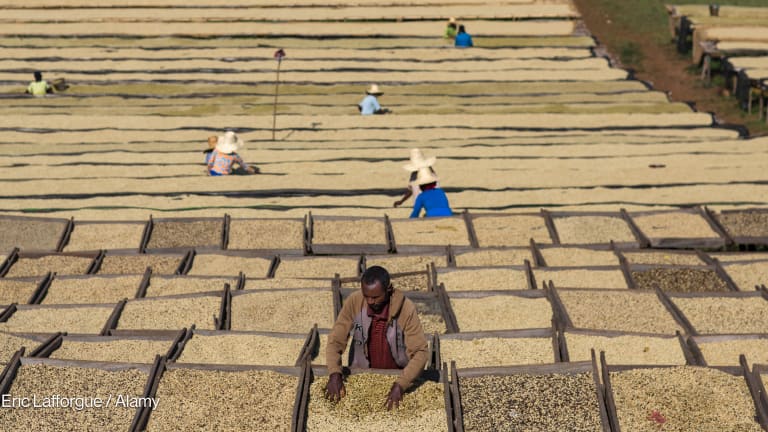The challenges facing Africa's development finance institutions
National and regional DFIs have operated with varying levels of success across the African continent — held back by key barriers such as inadequate funding, poor governance, political interference, and a tendency to stray from their mandate.
NAIROBI — The financing needs for development across Africa are huge, and while local development finance institutions, or DFIs, were set up to help fill a critical private investment gap, they have often been held back by a number of challenges. African-based regional and national DFIs have operated with varying levels of success across the continent — held back by key barriers such as inadequate funding, poor governance, political interference, and sometimes straying from their mandate. Another issue, according to experts, is that these national and regional institutions have not gotten the recognition they deserve. “There needs to be a change in the discussion at the international level, in general, to highlight how important DFIs are,” said Jesse Griffiths, former development finance expert at the Overseas Development Institute. “We should be helping countries to strengthen their existing institutions or set up new ones if they don't exist.” Devex spoke with experts about the challenges these institutions face and strategies for strengthening them. Shortfalls in funding and governance A key strength of regional and national DFIs in Africa is their ability to bring life to development projects that have strong social benefits but might otherwise not receive financial support — often because there is not enough of an incentive for the private sector to invest. These could include projects in rural areas or in new sectors, such as renewable energy. Development banks can provide long-term, affordable funding — something that many countries desperately need to finance sustainable development. “There is no model of emerging markets that grew without development banks,” said Mukhisa Kituyi, secretary-general of the United Nations Conference on Trade and Development, in an interview with Devex. But there have been barriers preventing many of them from achieving the impact they could on the continent. While there is a continentwide DFI, the African Development Bank, the regional and national institutions have more challenges in terms of effectiveness, according to experts. “One can only speak of a few countries that still have strong and vibrant national DFIs,” said Charles Adjasi, professor of development finance and economics at the University of Stellenbosch Business School. “At the national level, there's a much bigger problem with DFIs in Africa. Very few are doing very well.” A key issue is that regional and national DFIs across the continent do not have enough capital. This problem is most pronounced among national DFIs, because much of the funding comes from poorly resourced governments, Adjasi said. As a result, some DFIs have turned to private borrowing to shore up their capital, but that can alter a DFI’s decision-making process. When a DFI borrows from private capital markets, it is often at a higher interest rate than funding it might get from the government or other domestic sources. The DFI might then choose to invest in projects that yield higher financial returns within a shorter amount of time to pay back the loan. This could mean that investments are made in projects that have a smaller development impact, Adjasi said. Governance is also a critical challenge, according to experts. “Historically, national DFIs, in particular, have had difficulty striking the balance between autonomy and decision-making and, at the same time, being government-owned and -sponsored and therefore needing to follow government directives,” said Diana Smallridge, CEO of International Financial Consulting. “There needs to be a change in the discussion at the international level ... to highlight how important DFIs are.” --— Jesse Griffiths, former development finance expert, Overseas Development Institute That pressure can push DFIs to stray from their mandate. For example, the government might instruct an agricultural development bank to invest in an energy project, Adjasi said. Members of the government might also appoint people with no background in development finance to the board of a national DFI, which can impact the board’s effectiveness, he added. DFIs struggle to ensure they have the necessary human capital, too. For example, a DFI might need to conduct a technical assessment or appraisal for a proposed project but might not have adequate staff with those skills, he said. Strengthening Africa’s regional and national DFIs To increase capital, national and regional DFIs may want to draw in institutional investors, such as pension funds, to increase their capital base. To do this, a DFI should focus on making sure its value proposition is credible, said Admassu Tadesse, president and chief executive at the Eastern and Southern African Trade and Development Bank, or TDB. That means institutions need to have strong governance structures, good decision-making and talent-management frameworks, and solid financials and track records on projects, he said. Institutional investors will also want to see a return on investment. “If you're using institutional capital, you better make sure that you are hard-nosed enough to run a professional shop where you can achieve those risk-adjusted returns alongside the development impact,” he added. “That is the holy grail everyone is looking for because many development banks have had huge challenges being profitable — and being profitable over a sustained period.” National governments could also issue DFI-related bonds, Adjasi said, and DFIs should work to tap wealthy individuals on the continent. DFIs can leverage private capital to do more with less. They can “crowd in” private capital by pooling risks on projects, said Brahima Sangafowa Coulibaly, director of the Africa Growth Initiative at the Brookings Institution. This could include a DFI using its capital at the beginning of a project to reduce risks and make it bankable, then selling it out to private sector investment and moving it off the DFI’s balance sheet, he added. “There is no model of emerging markets that grew without development banks.” --— Mukhisa Kituyi, secretary-general, United Nations Conference on Trade and Development To fund long-term development projects, DFIs need long-term financing, such as bonds and lines of credit with long-term maturities, in addition to long-term equity, according to Tadesse. A DFI needs to be structured in a way that is sustainable and independent, he said. To achieve this, there are limits on the levels of risk a DFI can take on, Tadesse added. But there are also ways to mitigate some of this risk. For example, staff members can be tuned into and responding to the marketplace, structuring deals in a way that are not open-ended in terms of risk and carefully managing cash flows, he said. If a development bank is funded solely by national budget resources, it is able to be more aggressive with risk-taking. But if it is funded through capital markets, institutional investors, or shareholders that push the DFI to preserve its capital or earn a certain level of return on its investments, this will dictate the risk-taking behavior of the institution,Tadesse said. “As always, institutions will turn out the way their masters have designed them to be,” he said. On the governance side, there is a strong need for a structure that immunizes national DFIs from political interference, according to Smallridge, who has worked with DFIs across the African continent. “Without that, these organizations cannot realize their full potential as key instruments in economic development in the country,” she said. DFIs need management that is committed to the standard credit process to ensure every project is given the same due diligence, Smallridge said. There is also a need for the DFI to be clear on its priorities. “It's critical that they find market opportunities that the commercial banks or other financial institutions aren't willing to invest in — and structuring them so that they can be financially viable,” she said. Regional DFIs tend to be stronger than national DFIs in Africa due to the governance structure, with the benefit of having multiple shareholders and a diversified portfolio because many countries are involved, Tadesse said. The stakeholders of TDB, for example, include ministries of finance, central banks, domestic pension funds, insurance companies, and other specialized financial institutions, Tadesse said. Examples of strong regional DFIs include the Development Bank of Southern Africa, owned and managed by South Africa, as well as the ECOWAS Bank for Investment and Development, Adjasi said. The Association of African Development Finance Institutions has issued a set of standards in areas such as governance and financial policies to set a baseline for how the institutions should operate. Each year, the continent’s DFIs do a self evaluation against those standards and undergo a peer-review process, which can help expose gaps in performance and rewards those that are well rated, Tadesse said. Adva Saldinger contributed reporting to this article.
NAIROBI — The financing needs for development across Africa are huge, and while local development finance institutions, or DFIs, were set up to help fill a critical private investment gap, they have often been held back by a number of challenges.
African-based regional and national DFIs have operated with varying levels of success across the continent — held back by key barriers such as inadequate funding, poor governance, political interference, and sometimes straying from their mandate.
Another issue, according to experts, is that these national and regional institutions have not gotten the recognition they deserve.
This story is forDevex Promembers
Unlock this story now with a 15-day free trial of Devex Pro.
With a Devex Pro subscription you'll get access to deeper analysis and exclusive insights from our reporters and analysts.
Start my free trialRequest a group subscription Printing articles to share with others is a breach of our terms and conditions and copyright policy. Please use the sharing options on the left side of the article. Devex Pro members may share up to 10 articles per month using the Pro share tool ( ).
Sara Jerving is a Senior Reporter at Devex, where she covers global health. Her work has appeared in The New York Times, the Los Angeles Times, The Wall Street Journal, VICE News, and Bloomberg News among others. Sara holds a master's degree from Columbia University Graduate School of Journalism where she was a Lorana Sullivan fellow. She was a finalist for One World Media's Digital Media Award in 2021; a finalist for the Livingston Award for Young Journalists in 2018; and she was part of a VICE News Tonight on HBO team that received an Emmy nomination in 2018. She received the Philip Greer Memorial Award from Columbia University Graduate School of Journalism in 2014.








